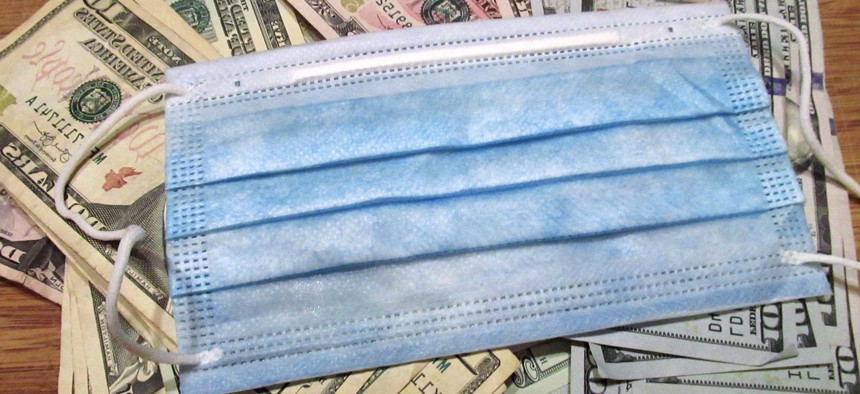
“The need is urgent,” said Sen. Patrick Leahy, D-Vt., chair of the Senate Appropriations Committee, in a statement. Keith Getter/Getty Images
Coronavirus Roundup: Democrats Propose $21 Billion in Emergency Supplemental COVID and Public Health Threat Funds
There’s a lot to keep track of. Here’s a list of this week’s news updates and stories you may have missed.
President Biden tested negative for COVID-19 on Wednesday. He said the fact he was able to continue working while in isolation is a “real statement on where we are in the fight against COVID-19” because of the vaccines, boosters and therapeutics available and drew a stark contrast to President Trump’s experience with COVID-19 in October 2020.
“To my friends in Congress, let’s keep investing in these tools -- vaccinations, treatments, tests, and more -- so we can help [make] them available to the American people on a permanent basis,” Biden said. “Let’s get moving. When I say a ‘permanent basis’: as long as they are needed. Let's keep moving forward safely.” Here are some of the other recent headlines you might have missed.
Here are some of the other recent headlines you might have missed.
Three top Senate Democrats introduced a new $21 billion emergency supplemental funding bill for the next phase of the COVID-19 pandemic and other public health threats, which could include monkeypox. “For months, the alarm has been raised that we are insufficiently prepared for the next phase of this pandemic,” said Sen. Patrick Leahy, D-Vt., chair of the Senate Appropriations Committee, in a statement. “The need is urgent, and this emergency supplemental funding bill provides the necessary resources to prepare for the current and anticipated surge in cases this fall and winter, save lives, and support our efforts to stamp out this virus here and abroad.” The Biden administration has been asking Congress for more funds for the COVID-19 response for months, but to no avail.
The White House hosted a “Future of COVID-19 Vaccines” summit on Tuesday to discuss the next generation of vaccines. “There's a lot of work happening inside the U.S. government and in private industry on the true next generation of COVID-19 vaccines,” White House Press Secretary Karine Jean-Pierre, said on Monday during a briefing. “And the summit will feature some of the cutting-edge work being done by U.S. government scientists, scientists in the private sector, companies -- American companies who are working on these issues.”
“Preparing for and preventing pandemic” is one of the White House’s research and development priorities for fiscal 2024 as it starts the budget request process. “Almost every agency has a role in pandemic preparedness and prevention, and budget submissions should expand upon previous pandemic preparedness and biodefense R&D investments to address priority areas for fundamental science and technological innovation,” wrote Shalanda Young, director of the Office of Management and Budget, and Alondra Nelson, who performs the duties of the director of the Office of Science and Technology Policy, in a memo to agency and department heads last week.
Ten senate Republicans want the Health and Human Services Department watchdog to look at the “COVID Community Corps” the Biden administration launched in spring 2021 to boost vaccine education. “We are concerned that some of these ‘founding members’ may inappropriately receive direct or indirect funding and support from HHS for partisan activities,” the lawmakers wrote in a letter on Monday. "During a typical election these groups mobilize thousands of volunteers and paid activists on behalf of Democratic party politicians and partisan progressive campaigns.” The senators are also concerned that the groups inappropriately gained access to personally identifiable data held by HHS.
Yvonne Gamble, spokesperson for the HHS inspector general office, told Government Executive: “We have received the letter and are reviewing it to determine the appropriate course of action.”
The HHS inspector general will be doing an audit of the Centers for Disease Control and Prevention’s $1 billion “Vaccinate with Confidence” strategy. “For the first audit, we will determine how much of each [state, tribal, local, and territorial recipient's award had been expended at the time of our audit, identify the best practices used and potential barriers STLT recipients faced when spending the supplemental ARP funds, and determine whether CDC provided oversight to [the] recipients in developing and implementing a vaccine confidence strategy,” said the work update posted this month. “For the second audit, we will determine whether select [the] recipients used supplemental [American Rescue Plan] funding in accordance with federal requirements and applicable award terms and conditions, and for underserved communities.”
Fourteen Senate Democrats called on the Federal Bureau of Prisons and Immigration and Customs Enforcement leaders on Monday to make COVID-19 therapeutics more available for prisoners and detainees as individuals in congregate settings are at a higher risk for contracting COVID-19. They also asked for updated information on their testing and other COVID-19 protocols by September 9.
After issues with COVID-19 and now monkeypox, Sen. Mitt Romney, R-Utah, proposed on Thursday a new agency to improve access and collection of public health data and bolster the nation’s surveillance of infectious diseases and preparations for them. “This data already exists in electronic forms across laboratories, clinics, and hospitals, but is incomplete and fragmented across the Department of Health and Human Services and is not shared quickly enough to drive decision making,” said a press release from the senator’s office. The Center for
Public Health Data would aggregate this existing data to make it more accessible in real time.” It would be an independent data subagency within HHS led by a chief data engineer.
Help us understand the situation better. Are you a federal employee, contractor or military member with information, concerns, etc. about how your agency is handling the coronavirus? Email us at newstips@govexec.com.







